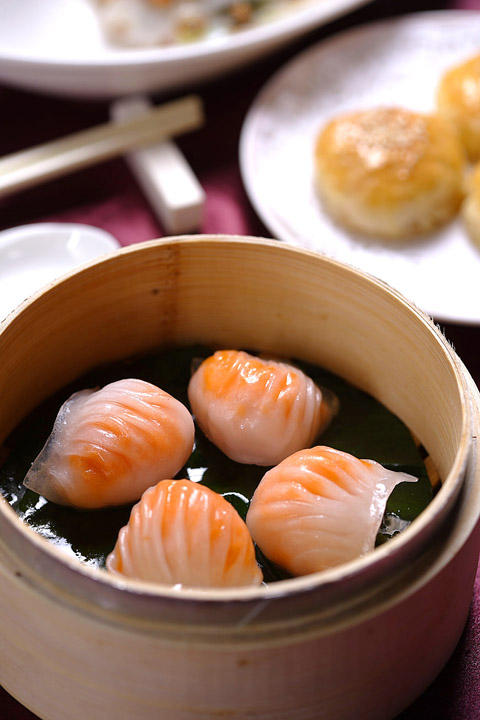It is surprisingly difficult to get really good Cantonese food in Taipei, and the Grand Formosa Regent is attempting to step into the breach with the creation of its new Silks House (晶華軒) restaurant, which opened last month. It's taking over the premises of the Lan Ting (蘭亭) Shanghainese restaurant with very little modification to Hashimoto Yukie's calligraphy-inspired decor. The food, on the other hand, has made a considerable transition under the guidance of chef Wu Hong-chen (伍洪成), who's gained an international reputation as the chef of presidents, having been for many years the executive chef of choice to preside over state banquets.
One of Silks House's main attractions is the "dim sum" menu, those delightful Cantonese snacks most often served in a steaming basket and designed to be eaten with tea. These snacks can be coupled with one or two main dishes to make a meal that does not break the bank. For more lavish dinning, Silks House is not short of spectacular banquet dishes, either. Wu is renowned for his research into Cantonese cuisine's classic dishes and has added a number of rarely seen specialties to the menu.
Silks offers a wide range of high-quality teas priced between NT$60 and NT$120 per person, from the usual jasmine and pu'er to exotic, high-end brews for connoisseurs. The snacks, which range in price from NT$90 chicken's feet, in this instance jazzed up with XO sauce, to NT$280 for baked egg tarts with bird's nest (燕窩烤蛋塔). Silks has made a concerted effort to make its snacks exotic with the addition of high-priced ingredients, and while this works in some cases - the pan-fried turnip cake with dried scallop (瑤柱蘿蔔糕, NT$100) is refreshingly light and the scallops give it a really surprising taste - in other cases, as with the egg tarts, the benefits were negligible.

PHOTO COURTESY OF GRAND FORMOSA REGENT
Main dishes start at around NT$400 and feature a mixture of traditional favorites excellently made, such as stir-fried grouper with yellow chives (韭黃炒龍膽魚球, NT$480), to variations of tradition such as the roast duck Grand Formosa style (晶華片皮鴨, NT$2,000), which is sliced at table, served with unique oat pancakes, wrapped with an unusual mixture of sweet peppers and young ginger, and includes a soup made from the bones of the duck.
There is more than enough variety to keep even the most ardent foodie busy. The Silks brand will also be expanding, with the new Silks Palace scheduled to open in the grounds of the National Palace Museum mid-May.

April 14 to April 20 In March 1947, Sising Katadrepan urged the government to drop the “high mountain people” (高山族) designation for Indigenous Taiwanese and refer to them as “Taiwan people” (台灣族). He considered the term derogatory, arguing that it made them sound like animals. The Taiwan Provincial Government agreed to stop using the term, stating that Indigenous Taiwanese suffered all sorts of discrimination and oppression under the Japanese and were forced to live in the mountains as outsiders to society. Now, under the new regime, they would be seen as equals, thus they should be henceforth

Last week, the the National Immigration Agency (NIA) told the legislature that more than 10,000 naturalized Taiwanese citizens from the People’s Republic of China (PRC) risked having their citizenship revoked if they failed to provide proof that they had renounced their Chinese household registration within the next three months. Renunciation is required under the Act Governing Relations Between the People of the Taiwan Area and the Mainland Area (臺灣地區與大陸地區人民關係條例), as amended in 2004, though it was only a legal requirement after 2000. Prior to that, it had been only an administrative requirement since the Nationality Act (國籍法) was established in

Three big changes have transformed the landscape of Taiwan’s local patronage factions: Increasing Democratic Progressive Party (DPP) involvement, rising new factions and the Chinese Nationalist Party’s (KMT) significantly weakened control. GREEN FACTIONS It is said that “south of the Zhuoshui River (濁水溪), there is no blue-green divide,” meaning that from Yunlin County south there is no difference between KMT and DPP politicians. This is not always true, but there is more than a grain of truth to it. Traditionally, DPP factions are viewed as national entities, with their primary function to secure plum positions in the party and government. This is not unusual

US President Donald Trump’s bid to take back control of the Panama Canal has put his counterpart Jose Raul Mulino in a difficult position and revived fears in the Central American country that US military bases will return. After Trump vowed to reclaim the interoceanic waterway from Chinese influence, US Defense Secretary Pete Hegseth signed an agreement with the Mulino administration last week for the US to deploy troops in areas adjacent to the canal. For more than two decades, after handing over control of the strategically vital waterway to Panama in 1999 and dismantling the bases that protected it, Washington has